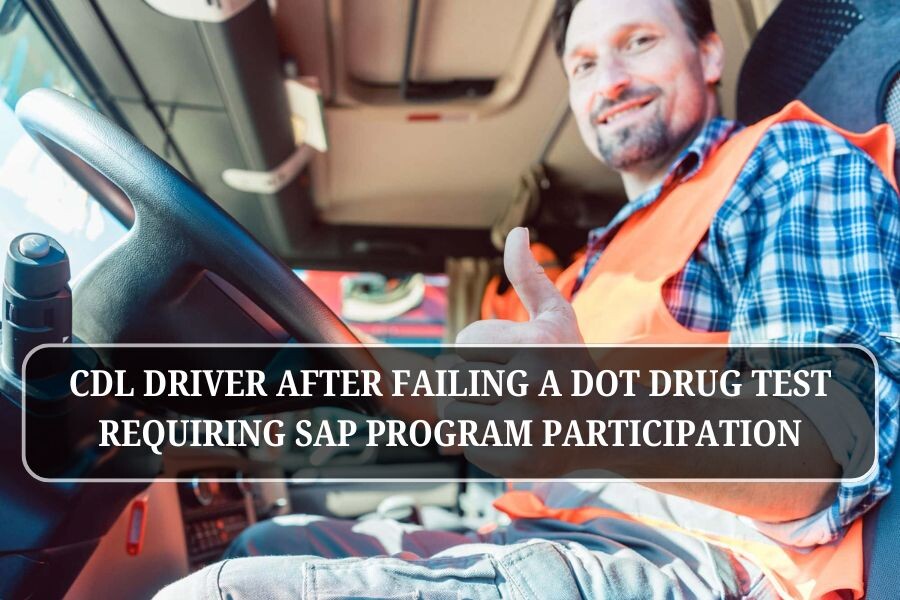Failing a Department of Transportation (DOT) drug or alcohol test can be overwhelming, especially if you’re unsure what happens next. One of the most common questions drivers ask is:
Is the DOT SAP program mandatory after failing a drug test?
Yes — according to the FMCSA (Federal Motor Carrier Safety Administration) guidelines, completing the SAP process is mandatory before returning to any safety-sensitive position.
We’ll break down what the DOT SAP program is, why it’s required, what the FMCSA says about it, and how you can get back to work safely and legally.
What Is the DOT SAP Program?
The Substance Abuse Professional (SAP) program is a structured return-to-duty protocol required for commercial drivers who violate DOT drug or alcohol regulations. This includes:
- Failing a drug test
- Refusing to take a test
- Being found in possession of alcohol or controlled substances on duty
The SAP program is not optional. According to 49 CFR Part 40 of the DOT’s regulations, any driver found to be in violation must complete the SAP evaluation process before returning to safety-sensitive duties.
What Does the FMCSA Say About SAP Requirements?
The FMCSA makes it clear that:
- Drivers who fail or refuse a DOT drug test are immediately removed from safety-sensitive functions.
- To return to duty, the driver must complete the SAP process, which includes an evaluation, treatment or education, and a follow-up test.
- Only a DOT-qualified SAP may conduct these evaluations.
This means that employers cannot bypass this requirement, and drivers cannot resume work in roles involving commercial vehicle operation until the SAP program is completed.
Steps to Return to Duty After a Failed Drug Test
Here’s what the mandatory DOT SAP process typically looks like:
- Initial SAP Evaluation – You meet with a DOT-qualified SAP for an assessment.
- Education and/or Treatment Recommendation – The SAP outlines a personalized plan (e.g., counseling sessions or substance abuse classes).
- Follow-Up SAP Evaluation – Once your program is complete, you meet with the SAP again for clearance.
- Return-to-Duty Test – You must take and pass a directly observed drug test.
- Follow-Up Testing Plan – You’ll undergo unannounced follow-up testing for 12–60 months.
What Happens If You Don’t Complete the SAP Program?
If you don’t complete the SAP program, you are barred from performing any safety-sensitive duties for DOT-regulated employers. You also remain flagged in the FMCSA Clearinghouse, which all employers are required to check before hiring drivers.
Why You Shouldn’t Delay the SAP Process
Skipping or delaying the SAP process can lead to serious consequences, including:
- Loss of current employment
- Ineligibility for rehire in safety-sensitive positions
- A permanent record of non-compliance in the DOT Clearinghouse
Find a DOT-Qualified SAP and Get Back to Work
If you’ve violated DOT drug and alcohol regulations, completing the SAP evaluation process is the only approved path to return to duty. At AACS Counseling, we provide confidential, professional SAP evaluations to help you meet compliance requirements and return to work quickly — virtually or in-person, wherever you are.
At AACS Counseling, we offer:
- Certified DOT SAP evaluations
- Same-week appointments
- Virtual or in-person sessions
- Fast turnaround for your return-to-duty documentation
Final Thoughts: Is the DOT SAP Program Mandatory?
Yes, the DOT SAP program is mandatory for anyone who fails or refuses a DOT drug test. It’s the only FMCSA-approved path back to a safety-sensitive job.
Delaying or avoiding the process only extends the time you’re off the road. The good news? With the right support, many drivers complete the SAP process and resume their careers without issue.
